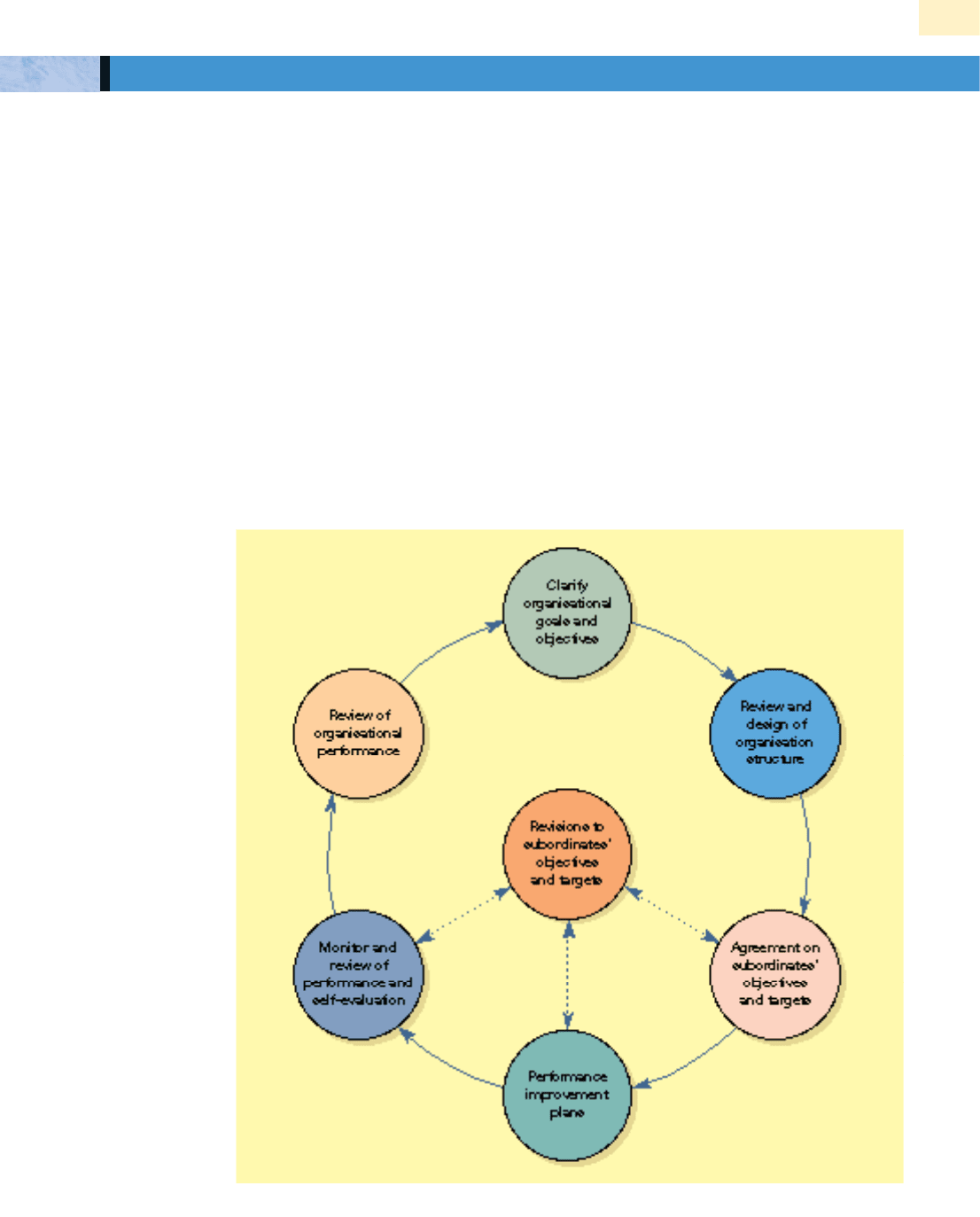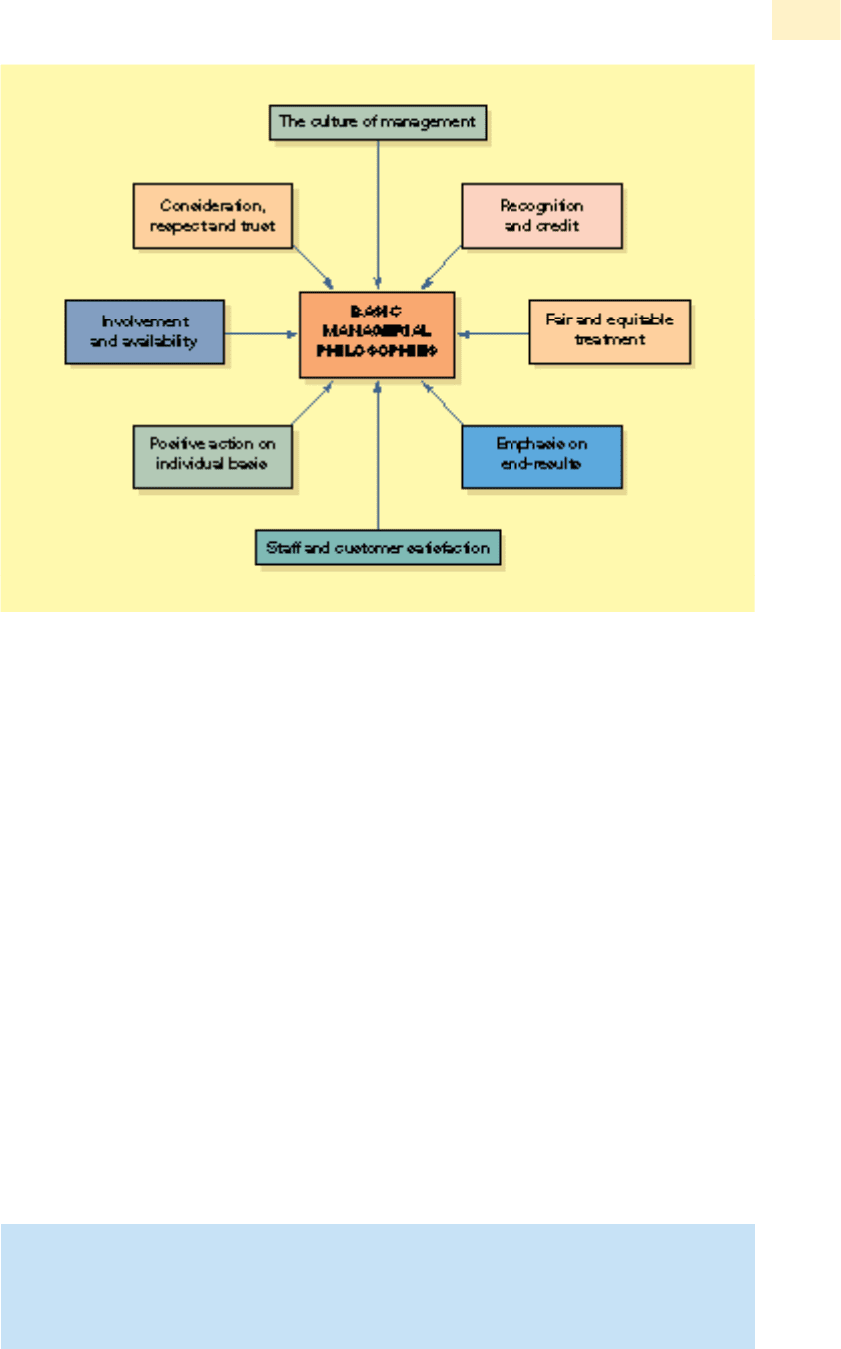Mullins L.J. Management and organisational behaviour, Seventh edition
Подождите немного. Документ загружается.


■ Organisation – the nature of the organisation in which the manager is employed,
and the extent to which there are rigid rules and regulations.
■ Values – the personal values, beliefs or ideals which the manager holds concerning
how to treat people or to manage results.
■ Personal history – the deep-rooted personal history of the manager may be an
important factor, and lead to a preference for a particular approach because that
style may have been experienced frequently in the past.
■ Chance – the manager may not have been confronted with, or had personal experi-
ence of, alternative sets of assumptions about how to manage. ‘Chance’ has not
provided the manager with an opportunity to learn.
From a review of the Managerial Grid programme, Lester believes it undoubtedly lends
itself supremely well to training programmes. Although its relevance to real-life issues
is less sure, in presenting a sophisticated learning package the Grid provides many
potential applications for those who wish to study organisation development.
15
According to Newborough, ‘an organisation’s structure, plan and concept are crucial
to its effectiveness. Yet beyond these, the most significant single factor is the behaviour
of the management team. Its members must act as leaders. They must accomplish their
objectives through their ability to guide, motivate and integrate the efforts of others.’
The ultimate purpose of studies of managerial style is to aid in the training and devel-
opment of those who wish to become better leaders. Grid organization development
identifies and applies relevant aspects of behavioural science, and Newborough main-
tains that the Managerial/Leadership Grid is as relevant today as when it was first
launched.
16
And according to Crainer and Dearlove: ‘Crude at it is, the Grid helps people
who are not conversant with psychology to see themselves and those they work with
more clearly, to understand their interactions, and identify the sources of resistance
and conflicts.’
17
Work by McGregor, and by Blake and Mouton, suggests that an organisation is more
likely to harness its staffing resources effectively if there is a participative style of man-
agement. This view is supported by the work of Likert. On the basis of a questionnaire
to managers in over 200 organisations and research into the performance characteris-
tics of different types of organisations, Likert identifies a four-fold model of
management systems.
18
These systems are designated by number:
System 1 Exploitive authoritative
System 2 Benevolent authoritative
System 3 Consultative
System 4 Participative
■ System 1 – Exploitive authoritative. Decisions are imposed on subordinates, moti-
vation is based on threats, there is very little teamwork or communication;
responsibility is centred at the top of the organisational hierarchy.
■ System 2 – Benevolent authoritative. There is a condescending form of leadership,
motivation is based on a system of rewards, there is only limited teamwork or com-
munication; there is responsibility at managerial levels but not at lower levels of the
organisational hierarchy.
■ System 3 – Consultative. Leadership involves some trust in subordinates, motiva-
tion is based on rewards but also some involvement, there is a fair degree of
teamwork, and communication takes place vertically and horizontally; responsibility
CHAPTER 7 MANAGERIAL BEHAVIOUR AND EFFECTIVENESS
245
Relevance
today
MANAGEMENT SYSTEMS

for achieving the goals of the organisation is spread more widely throughout the
hierarchy.
■ System 4 – Participative group. Leadership involves trust and confidence in subor-
dinates, motivation is based on rewards for achievement of agreed goals, there is
participation and a high degree of teamwork and communication; responsibility
for achieving the goals of the organisation is widespread throughout all levels of
the hierarchy.
Profile of organisational characteristics
Likert has also established a ‘profile of organisational characteristics’ describing the
nature of the four different management systems. The profile compares the four sys-
tems in terms of a table of organisational variables under the headings of:
1 leadership processes;
2 motivational forces;
3 communication process;
4 interaction–influence process;
5decision-making process;
6 goal-setting or ordering; and
7 control processes.
Using this table, Likert undertook a survey of several hundred managers comprising
different groups from a wide range of experience, and in both line and staff positions.
His studies confirmed that least productive departments or units tended to employ
management practices within Systems 1 and 2, and the most productive departments
or units employed management practices within Systems 3 and 4.
A shorter and simpler form of the profile of organisational characteristics is provided
by Likert and Likert (Figure 7.2).
19
The nearer the behavioural characteristics of an organisation approach System 4 the
more likely this will lead to long-term improvement in staff turnover and high produc-
tivity, low scrap, low costs and high earnings.
Likert sets out three fundamental concepts of System 4 management. These are the
use of:
■ the principle of supportive relationships among members of the organisation and in
particular between superior and subordinate;
■ group decision-making and group methods of organisation and supervision; and
■ high performance aspirations for all members of the organisation.
Supportive relationships are intended to enhance self-esteem and ego building, con-
tribute to subordinates’ sense of personal worth and importance, and maintain their
sense of significance and dignity. The superior’s behaviour is regarded as supportive
when this entails:
■ mutual confidence and trust;
■ help to maintain a good income;
■ understanding of work problems and help in doing the job;
■ genuine interest in personal problems;
■ help with training to assist promotion;
■ sharing of information;
246
PART 3 THE ROLE OF THE MANAGER
SYSTEM 4 MANAGEMENT
Supportive
relationships

■ seeking opinions about work problems;
■ being friendly and approachable; and
■ giving credit and recognition where due.
Group decision-making and supervision use an overlapping form of structure. Individuals
known as ‘linking-pins’ are members not only of their own group but also of the next
superior group and, where appropriate, of peer groups. This enables each work group to
be linked to the rest of the organisation. In System 4 management interaction and deci-
sion-making rely heavily on group processes, and discussions focus on the decisions to be
made. Likert emphasises that group methods of decision-making should not be confused
with the use of committees. With the group method of decision-making the superior is
held responsible for the quality and implementation of decisions. The superior is respon-
sible for developing subordinates into an effective
group.
CHAPTER 7 MANAGERIAL BEHAVIOUR AND EFFECTIVENESS
247
Figure 7.2 Short form profile of organisational characteristics
(Source: Adapted from Likert, R. and Likert, J. G., New Ways of Managing Conflict, McGraw-Hill (1976) p. 75. Reproduced with permission from the McGraw-Hill Companies Inc.)
Group
decision-making

In considering high performance aspirations, Likert refers to studies which suggest
that employees generally want stable employment and job security, opportunities for
promotion, and satisfactory compensation. They want, also, to feel proud of their
organisation, and its performance and accomplishments. In System 4 management,
superiors should therefore have high performance aspirations, but so also should every
member of the organisation. To be effective, these high performance goals should not
be imposed but set by a participative mechanism involving group decision-making and
a multiple overlapping group structure. The mechanism should enable employees to be
involved in setting high performance goals which help to satisfy their own needs.
Causal, intervening and end-result variables
Likert also refers to three broad classes of variables relating to the firm’s human organ-
isation and its operations: (i) causal, (ii) intervening and (iii) end-result.
■ Causal variables are independent variables which can be amended by the organisa-
tion and its management, for example management policies, the structure of an
organisation, and leadership strategies. Causal variables determine development of
an organisation and the results it achieves.
■ Intervening variables indicate the internal health of the organisation, for example
the loyalties, attitudes, motivations and performance of members and their collec-
tive capacity for interaction, communication and decision-making.
■ End-result variables indicate the final outcome and reflect the influences of inter-
vening variables. The end-result variables reflect the achievement of the organisation,
for example productivity, costs, scrap, earnings.
Attempts to improve the intervening variables are likely to be more successful through
changing the causal variables, rather than changing directly the intervening variables.
End-result variables are most likely to be improved by changing the causal variables,
rather than the intervening variables.
In Figure 7.3 Likert gives a simplified example of the interrelationships between causal,
intervening and end-result variables in the System 1 or 2, and System 4 management. The
arrows indicate the pattern of relationships between the three classes of variables.
248
PART 3 THE ROLE OF THE MANAGER
Favourable attitudes towards superior
High confidence in trust
High reciprocal influence
Excellent communication: up, down,
lateral
High peer group loyalty
High peer performance goals at all
levels re:
productivity, quality, scrap
Unfavourable attitudes, e.g., little
confidence and trust
Poor communication
Low levels of influence
Low levels of co-operative motivation
Low peer performance goals
Restriction of output
Principle of supportive
relationships
Group decision-making in
a multiple, overlapping
group structure
High performance goals
High pressure via: tight
work standards,
personnel limitations,
tight budgets imposed
Compliance based on fear
High absence and turnover
High productivity
over short run
Low productivity
and earnings over
long run
High productivity
Low scrap
Low costs
High earnings
Low absence and turnover
The presence of these variables yields these variables which, in turn, lead to these variables
Causal
variables
Intervening
variables
End-result
variables
System 4
System 1 or 2
10
118
9
5
7
6
1
2
3
4
Figure 7.3 Simplified diagram of relationships among variables for System 1 or 2 and System 4 operation
(Source: Likert, R., The Human Organization, McGraw-Hill (1967) p. 137. Reproduced with permission from the McGraw-Hill Companies Inc.)

One particular participative approach to the activities involved in planning, organisa-
tion, direction and control, and to the execution of work, is Management by Objectives
(MBO). MBO is a phrase used to describe a style or system of management which attempts
to relate organisational goals to individual performance and development through the
involvement of all levels of management. The underlying basis of a system of MBO is:
■ the setting of objectives and targets;
■ participation by individual managers in agreeing unit objectives and criteria of per-
formance; and
■ the continual review and appraisal of results.
The phrase Management by Objectives appears to have been introduced by Drucker in
1954.
20
The approach was taken up by McGregor who advocated its use as a preferred means
of goal-setting, appraisal of managerial performance and self-assessment. The system of MBO
has been adopted in a wide range of organisational settings, in the public as well as the pri-
vate sector.
MBO involves a continuous cycle of interrelated activities. (See Figure 7.4.)
■ The clarification of organisational goals and objectives. These should be communi-
cated clearly to, and understood fully by, all members of staff.
CHAPTER 7 MANAGERIAL BEHAVIOUR AND EFFECTIVENESS
MANAGEMENT BY OBJECTIVES (MBO)
The cycle of
MBO activities
Figure 7.4 The cycle of MBO activities
249

■ Review of organisational structure. The need is for a flexible structure and systems of
management which make for effective communications, quick decision-making and
timely feedback information.
■ Participation with subordinates in order to gain their willing acceptance of objec-
tives and targets, key result areas, and standards and measurements of performance.
■ Agreement on performance improvement plans which will enable subordinates to
make the optimum contribution to: (i) meeting their own objectives and targets;
and (ii) improved organisational performance.
■ Establishment of an effective monitoring and review system for appraisal of progress
and performance, including self-checking and evaluation.
■ Undertaking any necessary revisions to, or restatement of, subordinates’ objectives
and targets.
■ Review of organisational performance against stated goals and objectives.
To be fully effective, MBO also needs to be linked with a meaningful system of rewards
and career progression which recognises the subordinate’s level of contribution
and performance.
MBO is potentially an attractive system. It provides an opportunity for staff to accept
greater responsibility and to make a higher level of personal contribution. There is
much to recommend it to both the organisation and individual managers.
MBO, however, is not a panacea and it is subject to a number of criticisms and
potential limitations. MBO has been likened to a modern form of scientific manage-
ment. It is also subject to the same possible criticisms of too great an emphasis on
individual job definitions together with a management authority structure, and the
assumption of no conflict between individual and organisational goals. For example,
according to Crainer:
In practice, MBO demanded too much data. It became overly complex and also relied too heavily
on the past to predict the future. The entire system was ineffective at handling, encouraging or
adapting to change. MBO simplified management to a question of reaching A from B using as
direct route as possible. Under MBO, the ends justified the means.
21
It is not always easy to set specific targets or figures for certain more senior jobs, or
where the work involves a high degree of self-established role prescriptions (discussed
in Chapter 13). The same might apply to jobs which require a high level of inter-
personal relationships, especially where this involves confidential matters, such as
counselling. There is a potential danger that where objectives and targets are more dif-
ficult to specify and measure in precise terms these are neglected, and greater emphasis
is placed on objectives which are more easily monitored.
Relevance today
MBO appears to have suffered a decline in popularity. However, there are still differ-
ences in opinion. Rodgers and Hunter point out that MBO was originally designed as a
synthesis of three interventions found to increase productivity: participative manage-
ment, goal-setting and objective feedback. They suggest that recent survey studies
indicate that MBO is a widely used management system in both private and public
sector although the form and impact of MBO programmes vary considerably. From a
meta-analysis of 70 evaluation studies, Rodgers and Hunter found productivity gains in
68 studies. However, studies of MBO implementation suggest some programmes have
250
PART 3 THE ROLE OF THE MANAGER
EVALUATION OF MBO

been abandoned and others show modest effects. Furthermore, MBO is only fully effec-
tive if introduced with the full support and participation of top management.
22
By contrast, however, Heller paints a far less optimistic picture. He suggests that:
MBO had only one defect: it didn’t work. No matter how much care had been taken in formulating
the objectives, drawing up the plans and involving all the managers, the corporate targets were
invariably missed. So the technique passed away as one of the more fashionable management
theories, defeated by the refusal of reality to conform to the plan.
23
Arguably, a major reason for the apparent demise of MBO is that the basic idea and
fundamental features are now incorporated into modern systems of staff appraisal and
performance management systems. Greater attention to the setting of clear objectives
and levels of expected performance, flexible organisation structures and self-managed
teams, and empowerment and self-regulating feedback can be related to the essential
elements of MBO.
Naylor points out that affected by overtones of bureaucratic rigidity the name of
MBO has been changed to titles such as ‘staff appraisal’:
The difference between current appraisal methods and MBO is that they now avoid rigid commit-
ment to detailed objectives and action plans. Moreover, organisations themselves have become
less rigid with fewer layers. Managers and staff tend to be better qualified and often better trained.
These trends mean that the paperwork of grand systems is replaced by more informal processes.
24
And as, for example, Hannagan suggests: ‘Although it (MBO) has fallen out of fashion as a
system, many present day methods are very similar to MBO in their approach and
results.’
25
We have stated previously that, although there are many aspects to management, the
one essential ingredient of any successful manager is the ability to handle people effec-
tively. Recall the discussion in Chapter 2 on people and organisational behaviour.
Popular books on management and the nature of organisational effectiveness appear
to take a positive view of human nature and support an approach which gives encour-
agement for people to work willingly and to perform to the best of their ability.
26
Furthermore, an increasing number of organisations take apparent delight in expound-
ing (in their mission statements, corporate objectives, annual reports and the such)
that their employees are their greatest assets. However, as many of us will have wit-
nessed for ourselves, an understanding, people-centred approach to management
seems often to be lacking in practice. Too many managers still appear to attempt to
manage through the use of rules, systems, procedures and paperwork, rather than with
and through people. And as Gratton, for example, points out on the basis of six years
of study in conjunction with the London Business School, there has been no uniform
progress in people management, and ‘Yet for many people the reality of life in an
organisation is that they do not feel they are treated as the most important asset, or
that their knowledge is understood or used.’
27
It is important that managers have a highly developed sense of people perception,
and understand the feelings of staff, and their needs and expectations. It is people who
are being managed and people should be considered in human terms. A genuine concern
for people and for their welfare goes a long way in encouraging them to perform well.
The culture of management is important. For example, Freemantle suggests that a fes-
tering deficiency in management culture is that managers are not really concerned
about people until they become a problem. As a result:
CHAPTER 7 MANAGERIAL BEHAVIOUR AND EFFECTIVENESS
251
MANAGING PEOPLE
The culture of
management

management thinking has become corrupted by two major obsessions: (1) an obsession with
developing sophisticated systems for managing people more successfully (paper panaceas); (2)
an obsession with trade union power (union paranoia).
28
According to Freemantle, the perception of ‘people as costs’ leads to relatively little
weight being given to people management and leadership skills when appointing man-
agers. Many companies tend to appoint technical specialists to managerial positions,
neglecting the vital task of managing people. Chief executives and personnel managers
have allowed middle managers to opt out of the key task of leading their people in
favour of filling in even more forms (the paper panacea). However, Freemantle does
point out exceptions such as Mars, IBM, and Marks & Spencer, who in pursuit of excel-
lence devote a high priority to people management and considerable time, energy and
effort to the vital process of managing people.
In order to eliminate the corruption of management thinking, it is important to remove
the paper panaceas and divert attention from paranoia about trade unions. Freemantle
believes that managers must get back to the basics and concentrate their minds on five
essential principles (which are very much in line with the views of the author):
■ the successful management of people based on honesty, trust, openness, mutual
respect, co-operation and support;
■ developing a perception of employees as an essential asset to be invested in, rather
than a variable cost to be minimised;
■ ensuring managers have a clearly established set of principles (such as the above)
which they can apply on a minute-by-minute basis in their daily management task;
■ fundamentals of leadership (as opposed to leadership systems) relating to vision,
charisma and ability to gain team commitment and co-operation;
■ the establishment of basic but essential practices, such as: clarity about their
accountabilities; knowing how to care for people; knowing how to command
respect; knowing the difference between a leader and a manager; knowing how to
set high standards and achieve them; knowing how to manage people successfully
and to achieve individual managerial excellence.
A positive policy of investment in people and an interpersonal relationship approach
to management is, in the longer term, worth the effort. For example, the government-
sponsored initiative ‘Investors in People’ is based on a commitment to the benefits
organisations can gain from a rigorous approach to the development of human
resources. (Investors in People is discussed in Chapter 19.)
It is the belief of the author that there are a number of basic, underlying
philosophies which are likely to make for the successful management of people
and lead to improved work performance. (See Figure 7.5.)
People generally respond according to the way they are treated. If you give a little, you will
invariably get a lot back. Make people feel important and give them a sense of personal
worth. The majority of staff will respond constructively if treated with consideration and
respect, and as responsible individuals who wish to serve the organisation well.
For example, in discussing productivity through people, Peters and Waterman make
the following comment:
Treatpeople as adults. Treat them as partners; treat them with dignity; treat them with respect.
Treat them – not capital spending and automation – as the primary source of productivity gains.
These are fundamental lessons from the excellent companies’ research. In other words, if you
want productivity and the financial reward that goes with it, you must treat your workers as your
most important asset.
29
252
PART 3 THE ROLE OF THE MANAGER
BASIC MANAGERIAL PHILOSOPHIES
Consideration,
respect and
trust

And a similar point is made by Gratton:
Treatpeople with politeness, respect and dignity and in doing so create a strong role model for
others to follow. Building a reputation of fairness gives you a buffer against the times when the
policy is wrong, or you behave badly.
30
However, how can members of staff show that they can be trusted unless trust is first
placed in them? The initiative must come from management. ‘Lack of trust is proba-
bly one of the greatest time and resource wasters in the workplace. Managers who do
not trust their employees are probably wasting hours every week checking up on them
at every turn and failing to utilise the resources at their disposal.’
31
People can be praised to success. Give full recognition and credit when it is due and let
people know you appreciate them. Too often managers are unresponsive to good perform-
ance, which may occur the vast majority of the time, and appear to take this for granted;
but are quick to criticise on the few occasions when performance falls below expectations.
However, it should not be assumed that staff would necessarily take a lack of response
as a sign of positive recognition, rather than just the absence of criticism. So often you
hear the comment: ‘Well nobody has complained so I suppose everything is all right.’
What a poor indictment of management style! Positive feedback on good performance is a
strong motivator, and staff are then more likely to accept and respond to constructive criti-
cism. If staff are to take a pride in their work they need to know when they are performing
well and to receive appropriate recognition for their efforts.
CHAPTER 7 MANAGERIAL BEHAVIOUR AND EFFECTIVENESS
253
Figure 7.5 The effective management of people
Recognition
and credit
A sincere word of thanks from the right person at the right time can mean more to an employee
than a formal award … What is important is that someone takes the time to notice an achieve-
ment, seeks out the employee responsible and personally gives praise in a timely way.
Federico Castellanos, Vice President, Human Resources, IBM (EMEA)
32

Involve yourself with the work of the staff, and make sure you fully understand the dif-
ficulties and distastes of their duties and responsibilities. Ensure an open flow of
communications, and encourage participation and feedback. Take an active interest in
the work of staff but without excessive supervision or inhibiting their freedom of
action. Wherever possible be available to staff as a priority, rather than to administra-
tion. Remember the importance of giving time to listen genuinely to the feelings and
problems of staff. This means giving staff your full attention including adopting appro-
priate body language. Even if you disagree with their point of view it is important to
show that you understand, and are sensitive to, what they are saying. It is, however,
also important to note that being a good listener is a skill which needs to be developed
and as Fletcher, for example, reminds us: ‘Hearing is not listening. Listening is not a
passive activity. It is hard work. It demands attention and concentration.’
33
The approach of Management By Walking About (MBWA) together with informal
communication processes is often heralded as a positive management practice – and
indeed it may well be so. However, there is the danger of arousing mistrust among
staff, the suspicion of management snooping and doubts about ‘what are you doing
here?’ MBWA is unlikely to be effective unless perceived by staff as part of a broader,
genuine belief by management in the continuing importance of giving time to listen
to, and understand, the feelings and problems of staff.
Treat people fairly but according to merit. Ensure justice in treatment, equitable sys-
tems of motivation and rewards, clear personnel policies and procedures, avoidance of
discrimination, and full observance of all laws and codes of conduct relating to
employment. People expect certain outcomes in exchange for certain contributions or
inputs. A feeling of inequality causes tension and motivates the person to indulge in
certain forms of behaviour in order to remove or to reduce the perceived inequity.
34
Recall also the discussion on the psychological contract in Chapter 2.
Treat members of staff as individuals. Deal with individual situations on an individual
basis and avoid the ‘blanket’ approach. For example, it has come to the manager’s
attention that a couple of members of staff have failed to provide some urgently
requested information on time. The manager’s reaction is to send a circular to all mem-
bers of the department reminding them of the need for, and importance of, meeting
deadlines. This may appear to be an easy way out to the manager. But what is likely to
be the reactions of staff?
The two members concerned might shield behind the generality of the circular and
persuade themselves that it doesn’t apply particularly to them. They might even
choose to believe that the manager must be referring to other members of staff, per-
haps in a different section, and take little notice of the circular. In contrast, the
majority of staff in the department who do have a good record of providing requested
information on time may well be annoyed or upset by the circular.
There could be some staff who despite pressing personal difficulties have taken great
pride in their work and made a special effort to maintain an excellent record of
co-operation – quite possibly without any previous positive recognition from manage-
ment. It would be understandable if the reaction of these staff was one of
resentment and disillusionment, and with a possible adverse effect on their future
attitude to work. The manager has more to lose than to gain from adopting a ‘blanket’
approach to a particular problem and by the failure to take selective, positive action on
an individual basis.
Place emphasis on end-results and levels of actual performance and achievement,
rather than on compliance with detailed instructions, rules or regulations. For ex-
ample, where set attendance times are clearly seen as a necessary requirement of the
254
PART 3 THE ROLE OF THE MANAGER
Involvement
and
availability
Fair and
equitable
treatment
Positive action
on an
individual
basis
Emphasis on
end-results
